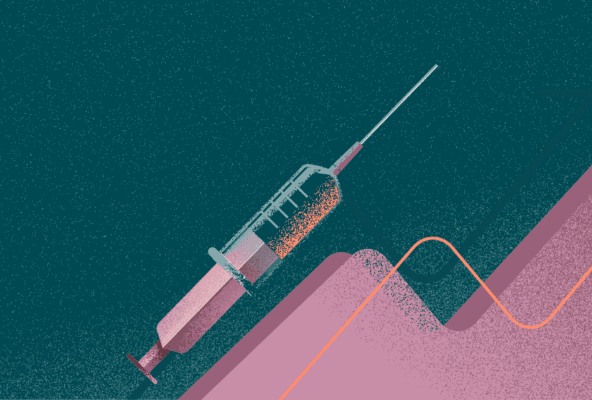Recent advancements in artificial intelligence (AI) and machine learning could revolutionize the landscape of healthcare and clinical medicine.
“AI” does not refer to a single technology but a collection of technologies that can be used in tandem to improve healthcare operational efficiency. For instance, large language models (LLMs) create text-only outputs, while generative AI can create many outputs. In machine learning, computational systems interpret and learn from patterns. And natural language processing translates human language into machine-readable data.
Generative AI can not only emulate certain functions of human intelligence, but also collect and analyze data at an unprecedented rate. This can help with medical discovery, diagnostic methods, drug development, and therapeutic uses.
AI assisted in rapid response to the SARS-CoV-2 pandemic. Providers use it to safeguard organizational financial health through revenue-cycle management. They use it to support clinical operations, such as operating-room management. They also use it in healthcare delivery, as it can aid clinical judgment and help doctors to determine a patient’s diagnosis, prognosis, and treatment plan.
Another common use case is AI-assisted image analysis. One survey indicates that 30% of radiology practices had adopted AI by 2020, and another 20% of practices intend to adopt it in the near future.
Until recently, medical professionals’ attitudes towards implementing AI in clinical practice remained a mystery. Broadly, like any rapid technological advancement, AI inspires some trepidation. It has the potential to impact conversations around the patient-practitioner relationship, data security, and job security. Doctors and patients are also apprehensive regarding dependence on a technology that may not be reliable, particularly in critical healthcare decisions.
A recent study to measure patients’ perceptions of AI reveals that “participants viewed AI positively but with reservations.” Participants generally viewed AI technologies as premature, with the vast majority preferring provider supervision over AI. Overall, participants had an easier time embracing AI as a support for their provider rather than as a replacement.
What is the true value of artificial intelligence in healthcare and how is it shaping the healthcare landscape? How can doctors integrate AI into their practices while maintaining a human connection with patients?
This article will explore the impact, advantages, and disadvantages of AI adoption in clinical practice, as well as the attitudes of medical professionals regarding these technological developments.
How healthcare professionals use AI to provide medical treatment
Governments, payers, regulators, and providers are increasingly motivated to explore innovative approaches, including AI, to reshape healthcare delivery models and impact patient care. AI is also helping to facilitate the safe exchange of data and information between key stakeholders, granting patients unprecedented access to their records.
After more than a decade of considerable attention around AI’s applicability in a clinical setting, the use and acceptance of AI in clinical practice remains limited, with numerous AI products for healthcare still in development.
AI is an asset to healthcare professionals in both administrative and clinical capacities. This encompasses routine responsibilities, as well as diagnostic processes and decision-making related to prescriptions.
Moreover, AI could be a viable approach to address prominent challenges in healthcare. It might minimize errors in medical diagnostics, drug treatments, and surgical procedures; optimize resource allocation; and refine overall workflows.
AI technologies such as robotic process automation (RPA) excel in managing repetitive tasks and working with large data sets, and can offer additional decision-making support, while machine learning assists in predicting disease.
Recently, AI has predicted lung cancer risk based on a patient’s computed tomography imaging with an accuracy rate of 94.4%, reducing misdiagnoses. Lung cancer screening via low-dose computed tomography reduces mortality by 20-43%. With AI, this process can be further optimized and automated for greater accuracy and wider access.
AI enhances communication between patient and provider through chatbots that help to evaluate patient symptoms and can recommend specific next steps. The integration of AI chatbots with wearable devices, such as smart watches, can keep patients and providers in contact and offer insights throughout treatment.
The application of AI in mundane and repetitive tasks holds promise for improving operational efficiency, precision, and objectivity in the healthcare domain.
The impact of artificial intelligence in medical education
AI has shown promise to facilitate the medical education experience. With its ability to simplify complex tasks and improve efficiency, it’s likely that AI involvement in medical education will increase. Recent studies demonstrate the applicability of AI within medical education, namely recording teaching videos in medical schools, facilitating a virtual inquiry system, as well as high-level medical distance courses. AI could also help to assess both written responses and medical image interpretations.
Presently, AI is used to train clinical professionals, as well as in continuing medical studies and undergraduate and postgraduate medical education.
Naturally, the rapid integration of AI technology in the clinical setting calls for a revision to the traditional medical education curriculum. A recent study indicates that the vast majority of medical students surveyed were in favor of a medical curriculum that includes structured training on AI applications and other applications of AI within the clinical setting.
To address the technological advancements, certain universities have initiated new medical courses tailored to fulfill the requirements of future intelligent medical practices in clinical settings.
Artificial intelligence plays a dual role in revolutionizing global medical education. It not only propels reform but also has the potential to transform the landscape and availability of medical education, enabling large-scale personalization and diversification.
How AI is changing medical imaging to improve patient care
Progress in computer vision, a field of artificial intelligence whereby computers extract data from images, videos, and other visual inputs, has the potential to contribute to healthcare, especially in diagnostic fields such as radiology and pathology.
AI-based systems are increasingly common in radiology in particular, and an unprecedented level of research is being conducted into the potential use cases of AI in medical imaging. The number of publications discussing the implications of AI in diagnostic imaging increased tenfold from 2008 to 2018; at the same time, the FDA has approved a growing number of AI-powered medical devices for use across the healthcare spectrum.
So far, medical imaging researchers have used AI to automate the identification of intricate patterns in imaging data in order to deliver quantitative assessments. In radiation oncology, AI has successfully identified a tumor, prescribed a treatment plan, and assessed treatment progress.
Due to its ability to process large quantities of medical images, AI can also help detect disease characteristics that may be imperceptible to the naked eye.
One of the most widespread use cases of AI is to analyze chest radiographs to help detect tuberculosis. This is life-changing in developing countries where conditions like tuberculosis often slip through the cracks of an overtaxed medical system. This represents one of the initial AI applications in radiology where the software operates autonomously, assuming the responsibilities traditionally carried out by radiologists.
AI provides an unprecedented level of processing power to medical imaging and radiology, and will likely continue to serve as an asset to radiologists, increasing the accuracy and efficiency of their work. As medical professionals across the board face greater workloads with less time, AI seems to be an attractive tool to help manage demands for productivity and efficiency and speed up the diagnostic process.
Pathology practices also use machine learning and deep learning, using image pattern recognition to help diagnose disease, provide a prognosis, and devise a treatment plan.
While a physician's physical condition and mood may give rise to variations in treatment, AI might circumvent such pitfalls, ensuring a more standardized approach.
Patients now have access to their own medical imaging reports, however few can accurately interpret them. Natural language processing technologies can help to improve patient understanding without interrupting the radiologist’s workflow.
Educating patients and improving their understanding of their health can contribute to a better patient-provider relationship. Additionally, better patient understanding drives more positive outcomes.
How doctors feel about AI in healthcare
The introduction of AI into the world of clinical medicine alters the role of the physician. AI replaces doctors in certain tasks of their medical practice, while physicians oversee these functions and interpret AI-optimized data through a human value-based lens.
While some healthcare professionals remain skeptical, AI does not threaten the role of the physician, but rather shifts it. Once less bogged down with data analysis, doctors can focus on patient outcomes.
In spite of the mostly unfounded claim that AI could eventually replace doctors altogether, the perception of physicians towards the use of AI in medicine remains mostly a mystery. To shed some light on this, a recent survey assesses what medical professionals think about AI in clinical settings. Of the 487 pathologist respondents surveyed, the overwhelming majority felt confident that AI would be implemented in their practice in the near future. They also felt that this would have mostly positive results for themselves as well as their patients.
Overall, respondents were optimistic about the integration of AI in diagnostic pathology. A significant proportion expressed either interest in (41.2%) or excitement about (32.1%) the incorporation of AI tools.
Respondents expressed little concern about potential negative career impacts. 38% of respondents believed that AI would not affect their employment opportunities. Others anticipated the creation of new positions and improved employment prospects (42.4%).
Additionally, the majority of respondents (58%) believed AI to be capable of increasing diagnostic efficiency. However, 48% felt that at the end of the day, diagnostic decision-making should remain with trained medical professionals.
The overwhelming majority (93%) of respondents would welcome AI into their practices if it enabled them to spend more time pursuing academic or research-related goals.
Tebra surveyed 1,000 Americans and another 500 healthcare professionals about their thoughts on integrating AI in healthcare. Tebra found that over 10% of respondents already use AI technologies, and nearly 50% plan to adopt them. The general population is optimistic about AI in healthcare. 8 in 10 Americans believe that artificial intelligence could improve the quality of healthcare, reduce costs, and increase accessibility.
The use of AI in private practices
Physicians who own independent practices grapple with balancing business requirements and administrative responsibilities with patient care.
There are instances where these physicians may prioritize the business aspects of their practices over serving patients.
AI presents an opportunity for independent practice providers to transform their approach to technology. It can enable them to dedicate more time to patient care and focus on efficient practice management simultaneously.
AI cannot take on the full workload of physicians. But it is well-positioned to transform healthcare for the better and improve the lives of medical professionals in the process, particularly those in private practice. By automating repetitive tasks like transcription, the inputting and organization of patient information, and offering diagnostic assistance, AI can serve as a valuable tool for physicians.
The future of AI technology in healthcare
There is considerable optimism regarding AI’s potential to enhance healthcare in many ways, including patient diagnosis, prognosis, and drug discovery. Additionally, AI is anticipated to function as an assistant for physicians, supporting precision medicine and contributing to a more personalized treatment plan for patients.
This optimism stems from successful AI applications in healthcare. However, it is essential to acknowledge that certain expectations about the extent of AI's capabilities and the future healthcare landscape are mostly unfounded.
Those asserting that AI has the capacity to entirely replace doctors, for example, overlook the broader role physicians play. Doctors must assess various treatment options and consider potential outcomes — a task where AI can offer statistical assistance but cannot fully replace the nuanced judgment and moral values inherent in human medical professionals. Additionally, AI cannot replicate the parent-provider relationship, a valued component of care.
While AI will not replace doctors any time soon, it may relieve heavy workloads and make the entire patient-provider experience more pleasant.
Providing medical professionals with access to better information, faster, helps to expedite decision-making so patients are diagnosed and presented with treatment plans sooner, the impact of which is difficult to overstate.
You might also be interested in
Learn how to create a seamless patient experience that increases loyalty and reduces churn, while providing personalized care that drives practice growth in Tebra’s free guide to optimizing your practice.
- Current Version – Dec 16, 2025Written by: Jean LeeChanges: Updated to reflect the most relevant information available.








